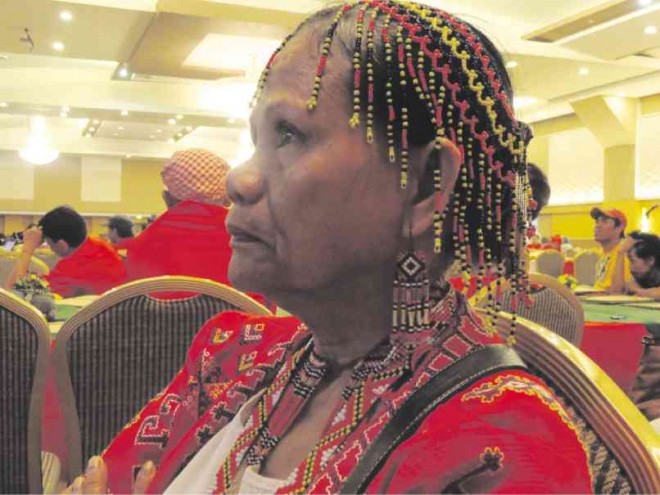
A MANOBO woman in tribal garb listens during a gathering of Mindanao tribal leaders in Tagum City, Davao del Norte province, on Nov. 19.
FRINSTON LIM/ INQUIRER MINDANAO
TAGUM CITY—Leaders of indigenous communities in Mindanao have called for the dropping of the term “lumad” in referring to them, accusing “various groups with vested interest” of exploiting it at the expense of indigenous communities.
About 1, 000 chieftains from at least 18 Mindanao indigenous peoples (IPs) tribes, who attended a gathering here last Thursday, have agreed to come up with another term that would identify the tribes in the island-region as distinct from their counterparts in the rest of the country, said Masli Quilaman, National Commission on Indigenous Peoples (NCIP) director for policy, planning and research.
The three-day gathering at Big 8 Corp. Hotel here, which started on Tuesday, was a forum of tribal leaders who are holders of official Certificates of Ancestral Domain Titles (CADTs) from five regions in Mindanao, according to Quilaman.
“We identified all ancestral domain areas in Mindanao, especially those issued with CADTs, and in terms of representation, we can see that those coming from these areas are the genuine representation (of IP communities),” Quilaman said.
Tribal leaders said recent incidents like killings, massive displacement and evacuation, particularly in Mindanao, happened in ancestral domain areas and victimized IPs.
“The term lumad does not represent Mindanao tribes because it is being used by non-IPs, like the settlers from the Visayas, to mean one who is an original resident of a particular place,” said Bai Norma Rivera, a B’laan-Tagabawa leader from Davao del Sur province. She said the term has achieved an unsavory connotation following the events of IP killings and attacks in Caraga region, and the alleged exploitation by left-leaning organizations of IP members, who were duped into participating in the Manilakbayan protests.
“Lately, that lumad term has been massacred and put in bad light so we decided to agree on what we want other people to call us,” said Rivera.
Over a dozen terms were submitted by participants during a workshop on Friday, from the familiar like “katutubo,” lumad, “tribu” and “tribong Mindanao,” to the straightforward IP-ish “katipanud,” “tipanud” and “mohingod.”
The tribal leaders, however, have yet to agree on and finalize what term they want to identify themselves with, Quilaman said.
The NCIP official said church-based organization that conducted missions in IP areas (in Mindanao decades ago) used the term lumad to refer to IPs, until its use became widespread. Now, this has become the generic term of IPs in Mindanao.
Leonor Quintayo, NCIP chair, said the term lumad “is not very descriptive of the IPs in Mindanao.”
“The term is really borrowed from the Visayan (Cebuano) dialect during deliberation on the 1987 Constitution just to have a name for the Mindanao IPs. In Luzon, it’s katutubo, so what about in Mindanao?
For lack of a better term, they had a compromise to use lumad. Until now it persisted,” Quintayo explained.
“Lumad would mean not only an IP, but also Cebuano, Ilonggo, Boholano or other groups who have been born here,” Quintayo said.
Aside from “tribong Mindanao,” Quintayo said there were few other terms submitted that are common and could be understood by majority of the participants, so they would not be forced to immediately come up with a new name to replace lumad.
Asked why having a new collective name could be such a pressing concern for the Mindanao IPs, Quilaman, said tribespeople put a high regard to their self-ascribed name, like everyone else.
“What would you feel if others call you by another name? I’m sure you wouldn’t want it,” Quilaman said. “Definitely, the credibility and integrity of that name given to you by others (would be questionable). Worse, it’s being used derogatorily.”
“You can see the pain in them that they’re being called by a name that does not originate from them,” he said.
The Indigenous Peoples’ Rights Act identifies one as an IP by self-ascription and ascription by others, Quilaman said, adding that “Self-ascription carries more weight. Confirmation or ascription by others that one is indeed an IP then follows.”
Following the protests staged by militant groups and participated in by IP groups from Mindanao before and during the Asia-Pacific Economic Cooperation (Apec) Leaders’ Meeting in Manila last week, participants in the forum slammed the protest organizers for allegedly using Mindanao IPs for propaganda purposes.
Datu Rico Maca, a Manobo chieftain from San Miguel, Surigao del Sur province, said “left-leaning organizations exploited the innocence of our brother-IPs.”
“When these organizations brought our fellow IPs to Manila, they were shouting against the so-called lumad killings and called for the dismantling of alleged rampaging militias. But now, they’re harping against the Apec summit. It’s clear we’re being manipulated to rail against an issue that is international and beyond level and concern,” Maca said in vernacular.
“We do not understand what Apec is all about. We appeal to these organizations not to use and exploit us,” Maca said, enumerating among others, organizations such as the rights group Karapatan, and the Catholic Church.
He said these exploitations prompted them to support the initiative of finding another term in lieu of lumad as shorthand for Mindanao IPs.
“We want tribong Mindanao, and not tribong Manobo because we want to see a united tribal people in the region,” Maca said.
Aside from issues about their identity, the tribal leaders presented issues also about peace and order affecting their communities, particularly those as the result of the ongoing conflict between the government and the communist rebels.
Quintayo, the NCIP chief, said her office has been calling for the resumption of the stalled peace talks between Manila and the communist leadership to end the more than 46-year insurgency that has killed over 40,000 people and blunted growth in one of the country’s richest regions. Frinston L. Lim, Inquirer Mindanao